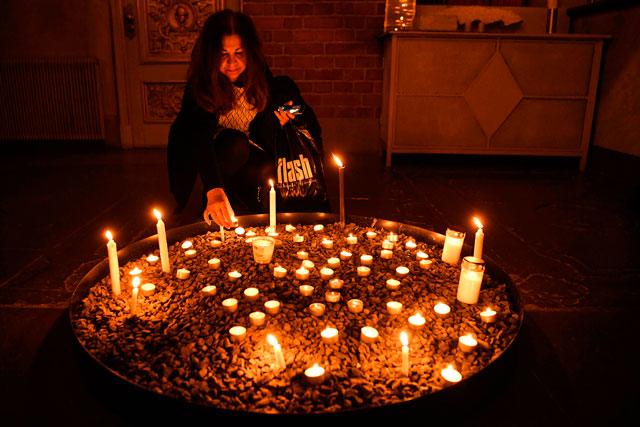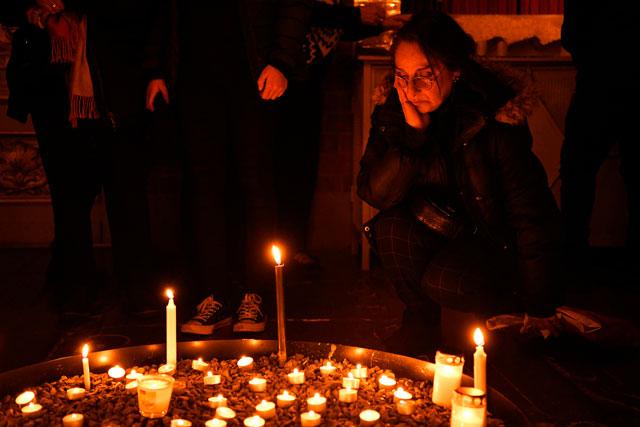You are here
Iran's president urges 'unity' after plane protests
By AFP - Jan 16,2020 - Last updated at Jan 16,2020

A mourner lights a candle at a memorial service for the victims of Ukrainian Airlines flight PS752 crash in Iran at Storkyrkan Church in Stockholm on Wednesday (AFP photo)
TEHRAN — President Hassan Rouhani appealed on Wednesday for "unity" and flagged the need for radical changes to the way Iran is run, after a wave of angry protests over the accidental downing of a Ukrainian airliner.
The Kiev-bound Boeing 737 was shot down in a catastrophic error shortly after takeoff from Tehran, killing all 176 people aboard.
One week on from the disaster, Rouhani called for "national unity" in remarks broadcast live on state television.
"If there was a delay" by the armed forces to release information about what happened, "let them apologise", he said.
The blunder and its handling by authorities sparked four consecutive nights of protests in Tehran calling for those responsible to resign or be prosecuted, leading to at least 30 arrests.
Iranian Foreign Minister Mohammad Javad Zarif said people were demonstrating because they were deceived for days.
“In Iran... people can state their views. Sometimes they state their views in excessive ways, sometimes the reaction is excessive,” he said in New Delhi.
“But the fact of the matter is, [over the] last few nights we’ve had people in the streets of Tehran, demonstrating against the fact that they were lied to for a couple of days.”
Amnesty International said Wednesday it had evidence security personnel used “unlawful force” by targeting protesters with rubber bullets, tear gas, pepper spray, and airgun pellets.
The London-based rights group said that “in many cases the actions by the security forces violated the absolute prohibition of torture and other ill-treatment under international law”.
A student association’s call to protest in Tehran on Wednesday afternoon was cancelled ahead of any gathering taking place.
Khamenei to lead prayers
State news agency IRNA said Iran’s supreme leader Ayatollah Ali Khamenei would lead Friday prayers in Tehran this week. It would be the first time he has done so in nearly eight years.
The latest protests have been much smaller than nationwide demonstrations against fuel price hikes in November that Amnesty International said left more than 300 dead in a crackdown by security forces.
The Ukraine International Airlines plane was downed with Iran on high alert hours after it fired a volley of missiles at US troops stationed in Iraq.
Iran launched the attack on Iraqi bases in retaliation for a US drone strike that killed Qassem Soleimani, the top commander of the Islamic Revolutionary Guard Corps’ foreign operations arm.
Rouhani also on Wednesday said Iranians wanted “diversity” as he urged electoral authorities to refrain from disqualifying would-be candidates from a February 21 parliamentary election.
That would mark a major shift in a country where candidates are vetted for their loyalty by constitutional watchdog the guardian council.
“The people are our masters and we are its servants,” Rouhani said.
“Allow all parties and groups to run for office,” he said. “The country cannot be governed by one political wing alone.”
Crisis after crisis
Iran has been rocked by crisis after crisis since 2018.
In May that year, US President Donald Trump unilaterally withdrew from a landmark 2015 agreement that gave Iran relief from sanctions in return for curbs on its nuclear programme.
Since then, the United States has slapped waves of sanctions on Iran as part of a “maximum pressure” campaign.
Washington says it seeks to rein in Tehran’s missile programme as well as its “destabilising behaviour” in the region.
Iran has hit back by progressively reducing its nuclear commitments.
On Tuesday, as tensions mounted over the downed airliner, European parties to the deal launched an arbitration process charging Iran with failing to observe its commitments to the accord.
Iran warned Britain, France and Germany they must “be prepared to accept the consequences” of their move.
‘American soldier not safe’
Rouhani blamed the Americans and their allies for causing “insecurity” across the Middle East.
Their “mistakes”, he said, included Soleimani’s killing, interventions in Iraq, Libya and Yemen, and the US decision to pull out of the nuclear deal and reimpose sanctions on Iranian oil.
“Security in this sensitive and important region will come at the expense of the entire world,” said Rouhani.
“Today the American soldier is not safe, tomorrow it could be the turn of the European soldier,” he added, warning the US and its allies to leave the region.
The downing of the plane came after a spate of disasters for Iran.
On January 7, at least 59 mourners were trampled to death at a funeral procession for Soleimani.
Iran has also been hit by flooding since Friday that has claimed at least three lives.
Rouhani said the disasters should lead to a “big decision” about Iran’s political system.
“And that major decision,” he said, “is national reconciliation”.
“These elections must be the first step.”
In 2017, Khamenei rejected the possibility of “national reconciliation”.
The idea, which called for more pluralism, had been presented at the time by reformists as a way to heal wounds left over from the disputed 2009 reelection of president Mahmoud Ahmadinejad.
Related Articles
TEHRAN — Iran's supreme leader said on Friday that demonstrations at home over the accidental downing of a Ukrainian airliner were unreprese
TEHRAN — Iran said Saturday it "unintentionally" shot down a Ukrainian passenger jet, killing all 176 people aboard, in an abrupt about-turn
DUBAI/LONDON — Iranian President Hassan Rouhani rejected his foreign minister's resignation as "against national interests" on Wednesday, bo


















